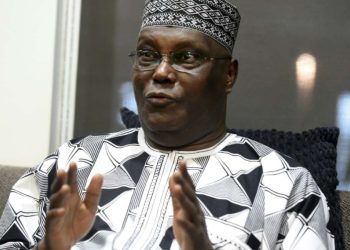As the global economy enters a pronounced slowdown amid fresh threats from COVID-19 variants and others, Nigeria’s growth is projected to strengthen to 2.5 per cent in 2022 and 2.8 per cent in 2023.
The World Bank said this in Washington at the presentation of its January 2022 Global Economic Prospects report.
According to it, global growth is expected to decelerate markedly from 5.5 per cent in 2021 to 4.1 per cent in 2022 and 3.2 per cent in 2023 as pent-up demand dissipates and as fiscal and monetary support is unwound across the world.
It said that a rise in inflation, debt and income inequality could endanger the recovery in emerging and developing economies, which Nigeria was a part of.
For Nigeria, the oil sector should benefit from higher oil prices, a gradual easing of the Organisation of the Petroleum Exporting Countries (OPEC) production cuts, and domestic regulatory reforms.
“Activities in service sectors are expected to firm as well, particularly in telecommunications and financial services.
“However, the reversal of pandemic-induced income and employment losses is expected to be slow, this, along with high food prices, restrains a faster recovery in domestic demand.
“Activities in the non-oil economy will remain curbed by high levels of violence and social unrest as well as the threat of fresh COVID-19 flare-ups with remaining mobility restrictions being lifted guardedly because of low vaccination rates.”
It noted that rising government debt and debt service costs would continue to constrain policy space and curtail public spending, leaving gaps in essential public services and infrastructure as a major obstacle to stronger potential growth.
For Angola, it said that growth was projected to strengthen to three per cent on average in 2022-2023.
“Higher oil prices and the easing of OPEC production cuts will support a gradual recovery in oil investments and output, while non-oil sectors will benefit from increasing vaccination rates.”
The bank also said that growth in South Africa was forecast to revert to its pre-pandemic trend, with the economy projected to grow by 2.1 per cent in 2022 and 1.5 per cent in 2023.
Globally, it predicts that the rapid spread of the Omicron variant indicates that the pandemic will likely continue to disrupt economic activities in the near term.
It added that a notable deceleration in major economies, including the United States and China, would weigh on external demand in emerging and developing economies.
“At a time when governments in many developing economies lack the policy space to support activities if needed, new COVID-19 outbreaks, persistent supply-chain bottlenecks and inflationary pressures, and elevated financial vulnerabilities in large swaths of the world could increase the risk of a hard landing.
“The slowdown will coincide with a widening divergence in growth rates between advanced economies and emerging and developing economies.
“Growth in advanced economies is expected to decline from five per cent in 2021 to 3.8 per cent in 2022 and 2.3 per cent in 2023, a pace that, while moderating, will be sufficient to restore output and investment to their pre-pandemic trend in these economies.”
In emerging and developing economies, however, it said that growth was expected to drop from 6.3 per cent in 2021 to 4.6 per cent in 2022 and 4.4 per cent in 2023.
According to the Bretton Woods Institution, by 2023, all advanced economies will have achieved a full output recovery; yet output in emerging and developing economies will remain four per cent below its pre-pandemic trend.
It added that for many vulnerable economies, the setback was even larger as output of fragile and conflict-affected economies would be 7.5 per cent below its pre-pandemic trend, while output of small island states would be 8.5 per cent below.
For Sub-Saharan Africa (SSA), the bank said that growth reached an estimated 3.5 per cent in 2021, supported by a rebound in commodity prices and a gradual easing of social restrictions.
Nevertheless, recurrent virus flare-ups in several countries and low vaccination rates slowed the pace of the recovery.
It however, forecast that the region’s growth would firm to 3.7 per cent a year on average in 2022 20-23.
According to the report, slow progress with vaccinations is expected to underpin only a gradual recovery of domestic demand, with substantial downside risks clouding the outlook.
It said that the risks were tilted to the downside as the region’s low COVID-19 vaccination coverage rates markedly elevate the threat of renewed outbreaks as well as the spread of more transmissible or vaccine resistant variants of the virus.
“If the distribution of vaccines proceeds at the current low rate, the extended duration and severity of the COVID-19 pandemic could still delay recoveries in many countries across the region.
“Persistent vaccine supply and distribution challenges risk making COVID-19 a recurrent public health problem in the region.
“Another downside risk to the regional outlook is the possibility that the global recovery could moderate further than expected, leading to a significant reversal of the gains in commodity prices recorded in 2021 to the detriment of the region’s oil and metals producers.
“Persistence of pandemic-induced long term damage is a significant risk to the baseline growth forecast as well.
“Disproportionate losses to incomes, employment and human capital accumulation experienced by vulnerable groups of population, especially in low-income countries and countries in fragile and conflict-affected situations (FCS), could hinder poverty alleviation and lead to lasting increases in inequality across the region.”
World Bank Group President, Mr David Malpass, said that rising inequality and security challenges were particularly harmful for developing countries.
“Putting more countries on a favorable growth path requires concerted international action and a comprehensive set of national policy responses.”
Mari Pangestu, the bank’s Managing Director for Development Policy and Partnerships, said that the choices policymakers make in the next few years would decide the course of the next decade.
According to him, the immediate priority should be to ensure that vaccines are deployed more widely and equitably so the pandemic can be brought under control.
“However, tackling reversals in development progress such as rising inequality will require sustained support.
“In a time of high debt, global cooperation will be essential to help expand the financial resources of developing economies so they can achieve green, resilient and inclusive development.”














